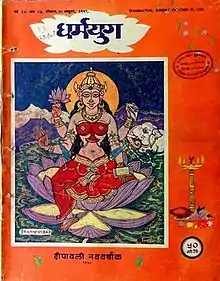Dharmyug
Dharmyug was a Hindi pictorial weekly[1][2] published by The Times of India Group from year 1949 till 1993.
History
The magazine was originally published by a Dalmia press in Bombay from 1949, just after independence of India, however it incorporated an earlier pictorial magazine Nav Yug that began in 1932.[3][4] Later on when the Dalmia group divested its stake from Bennett, Coleman & Co. Ltd. in 1948, Dharmayug remained with the Times of India group.[5] One of its chief editors was Pandit Satyakam Vidyalankar,[6] The magazine became popular and widely read when, in 1960, noted writer-playwright Dharmveer Bharti noted for his play, Andha Yug (1953), was appointed as its Chief Editor.[7] The noted Hindi poet and author served as the chief editor for the magazine from 1960 to 1987.[8] Dharmveer Bharti was a dedicated and widely admired editor, although was sometimes considered to have been authoritative by fellow journalists.[9] After Bharti's retirement, Ganesh Mantri, a Hindi journalist, was appointed Editor,[8] Vishwanath Sachdev took over from Ganesh Mantri, before the Times of India decided to close down the magazine in 1997.[10][11][12]
Contents and significance
The magazine covered all disciplines, including literature, art, fashion, culture, fiction, science and comics.[13][14] (although the name may imply Dharm = faith/duty, yug = age) Serialised stories of many Hindi popular writer and poets were published in the magazine.[13][15][16] Dhabbuji, a cartoon character created by Abid Surti, was also a regular feature.,[17] besides works of cartoonist, Kaak were regularly featured.
Dharmyug was considered to be the most respected publication of its time. Many distinguished authors got their break into the field when they published in Dharmyug.[18] Dharmyug also provided a beginning to painters like J.P. Singhal, who published his first painting in Dharmayug in 1954.[19]
It was a sad end to the saga of a Hindi magazine that once sold more than four lakh copies a week[16] and gave a platform to many new Hindi writers and poets, like Mrinal Pande and Rajesh Joshi. The magazine was the first to serialize that tremendous milestone of Hindi and Indian theater Aadhe Adhure by Mohan Rakesh, as well as the first to publish stories of Shivani.[15][16]
See also
- Life magazine 1883 to 1972
- The Illustrated Weekly of India 1880-1993 also published by Times of India
References
- "धर्मयुग की याद में एक अनूठा आयोजन, 31.12.2014, चन्द्रकांत जोशी". Archived from the original on 5 October 2016. Retrieved 12 May 2015.
- "धर्मयुग की याद ,कनुप्रिया का पाठ, Janadesh". Archived from the original on 5 October 2016. Retrieved 12 May 2015.
- Dharmyug, 20 July 1952, cover states that it incorporates Nav Yug
- The Michigan Alumnus, Volume 55, Jogendra N. Sahni, University of Michigan. Alumni Association, UM Libraries, 1948 p. 12
- Report of the Press Commission: Appendices. India. Press Commission, Jagadish Nataranjan. 1954.
- Guzarā kahām̐-kahām̐ se: ātmakathātmaka saṃsmaraṇa, Kanhaiyālāla Nandana, Rajpal & Sons, 2007, pp. 189-191
- "A trio of aces". The Times of India. 1 May 2010. Archived from the original on 2 February 2014.
- The Illustrated weekly of India: Volume 108, Issues 39-50, 1987.
- "ग़ालिब छुटी शराब, रवीन्द्र कालिया, Vani Prakasahn, 2000, 'धर्मयुग' का माहौल अत्यन्त सात्विक था। संपादकीय विभाग ऊपर से नीचे तक". Archived from the original on 21 September 2021. Retrieved 13 May 2015.
- Whose news?:the media and women's issues by Saga Publications, 1994.
- Kohli, Vanita; Kohli-Khandekar, Vanita (2006). The Indian media business By Vanita Kohli. p. 23. ISBN 9780761934691.
- India 1to15 March 1993 Dharmayug Magazine well illustrated Hindi Script #oi2612
- Lal, Mohan (2006). The Encyclopaedia Of Indian Literature (Volume Five (Sasay To Zorgot), Volume 5 By Mohan Lal. ISBN 9788126012213.
- Bibliographic methods and reading behaviour by Shrinath Sahai. Oriental Publishers & Distributors. 1976.
- "Shivani Gaura Pant - Indian Writers".
- "[Reader-list] Hindi little magazines". Archived from the original on 8 August 2010. Retrieved 28 February 2012.
- Dhabboji @ Dharamyug
- Is Hindi literature back in fashion?, KALYANI PRASHER, February 20, 2015 In 1987, the year after she turned 40, Pamela Manasi got her big break when Dharamyug published her story ‘Jagtu’.
- कला मेरे लिये कुरुक्षेत्र ही थी, वरिष्ठ कलाकार जे.पी. सिंघल से प्रभुजोशी की बातचीत, Abhivyakti, १९ जुलाई २०१०
